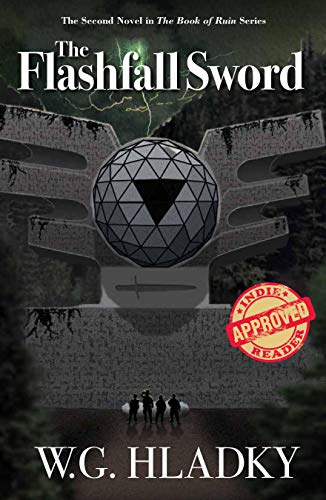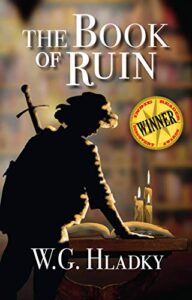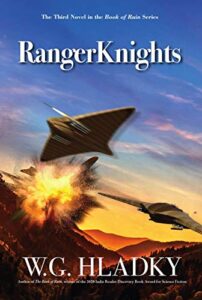The Flashfall Sword received a 4+ star review, making it an IndieReader Approved title.
Following find an interview with author WG Hladky.
What is the name of the book, and when was it published?
The Flashfall Sword, published in 2019.
What’s the book’s first line?
“Poets sing songs of days gone by, during a time after the Flash but before the Renaissance, when sunlight seared skins and a Dark Age tormented the lands.”
What’s the book about? Give us the “pitch.”
THE FLASHFALL SWORD is a prequel to THE BOOK OF RUIN, which won the 2020 IndieReader Discovery Award for Science Fiction. Senior Chief Weir’s great-grandfather, Ranger Lovecraft Weir, wields his Flashfall sword in the service of NATO at a time when a Dark Age torments the lands. A deadly pestilence spreads, mutating with terrifying efficiency. Shadowlanders flay enemies and ply women with potions to make them dimwitted and submissive. And young boys undergo grisly rites of passage to teach them to follow the Lord of Putridity. Only NATO keeps the Shadowlanders and pestilence at bay. But when a traitor betrays the alliance, and Shadowlander tribes come together to annihilate all those who are unseeded, NATO must overcome catastrophic losses and face its greatest challenge yet.
What inspired you to write the book? A particular person? An event?
I so enjoyed writing the first novel, I decided to delve deeper into its world and expand its history. I continued this exploration in the third book in the series, RANGERKNIGHTS (one word), which is currently with my editor. I am an avid reader of books that explore historical arcs, i.e., Robert Kaplan’s “The Revenge of Geography,” Thomas Cahill’s How The Irish Saved Civilization and the “What If?” books that suggest historical events might have turned out differently if a few things did or did not happen.
What’s the main reason someone should really read this book?
My stock answer to this question has been readers should read the book because it is an enjoyable yarn. However, I recently came across a statement by neuroscientist Antonio Damasio. He said humans are feeling machines that think, not thinking machines that feel, and that the surest way to invoke feelings is to tell a story. Sure, I want my readers to “enjoy” the story, but I also want them to “feel” the story the way I felt when writing the tale. I want them to feel the wonderment of exotic places, the rush of battle, the sorrow of loss, the thrill of love, the comfort of comradeship and the disgust for a villain.
What’s the most distinctive thing about the main character? Who-real or fictional-would you say the character reminds you of?
Let me talk not about a single main character, but many main characters, since my books just do not explore a single individual but several “protagonists” and their interactions. I base my the protagonists and their interactions on my thirty years as a Miami-Dade Police officer, which began during the cocaine-cowboy days when policing was similar to urban combat. (If you think I exaggerate, read the recently released book, “The Year of Dangerous Days: Riots, Refugees, and Cocaine in Miami 1980,” by Nicholas Griffin).
The protagonists in my first book, THE BOOK OF RUIN, are in their late thirties or forties. They are experienced veterans. For THE FLASHFALL SWORD, I thought back to when I was a rookie, working with rookies. In this book, my two protagonists are rookies in their twenties. Catherine Langrehr, in her IndieReader review of THE FLASHFALL SWORD, wrote about my two main characters: “(I)t’s lovely to see a solid male-female friendship that doesn’t need to be romantic at its core to be deeply meaningful to both of them.” In my police career, I was lucky enough to have about six close, long-term partners. Three of them were women. The two main characters in the prequel – he is straight; she is gay – are based on my experiences and observations. I observed from afar one police partnership between a gay woman and a straight man. When she was shot and killed in the line of duty, the man could not have been more emotionally devastated.
In my third book, RANGERKNIGHTS, I switched from third person to first person. The narrator is a 16-year-old Islamic Prince who goes on a journey with the American RangerKnights. The readers will let me know if the first person point-of-view worked.
When did you first decide to become an author?
I started writing after I found my post-retirement teaching gigs drying up due to the fallout from the Great Recession, leaving me with lots of spare time. Once I started writing science fiction, I found that I enjoyed it.
What do you do for work when you’re not writing?
Before the coronavirus, I frequently traveled overseas. I also lectured to police officers how violent encounters change their physiology and psychology, and how these changes help and hinder performance.
How much time do you generally spend on your writing?
I research/write about four hours a day, sometimes more if my head is into a scene.
What’s a great piece of advice that you can share with fellow indie authors?
Writing a story should be joyful, not drudgery, because the story takes writers to places they want to be, with people they want to be around. Approach the editing process as an opportunity to revisit old friends and haunts. When I rewrite, much of the time, I add more color to the environment and characters. I give them more depth, and this makes my time with them more enjoyable.



